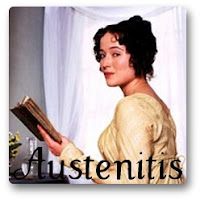Click here to go to the original
Susan Pevensie has always been considered "the pretty one" and "the beauty of the family" (Voyage 5, 154).* While she reigns as Queen Susan during Narnia's Golden Age, Prince Rabadash of Tashbaan seeks her hand in marriage. And when Shasta meets her, even he believes Susan is "the most beautiful lady he had ever seen" (Horse 61).
However, Lucy Pevensie seems to be rather plain, in comparison to her older sister. Except for a few suitors during the Golden Age of her reign, Lucy never receives the attention that Susan does -- at least from her family.
So when she is tempted with a beauty spell, while on Magican's island, Lucy nearly succombs. She has visions of being "throned on high at a great tournament in Calormen and all the Kings of the world [fighting] because of her beauty" (Voyage 153-54). Lucy then envisions herself "back in England" and Susan returning from America, but the older sister is "plainer and [has] a nasty expression" (154). Lucy rejoices that because of her "dazzling beauty," "no one care[s] anything about Susan now" (154).
Yet which is the truly beautiful sister? And what is true beauty?
In this modern age, surrounded by images, we women are told that physical appearance is what matters. We may not be told that beauty is skin deep, but that is the subtle message our modern culture is sending to women. So from the time we're teenagers, we worry about our weight, our hair, our clothes -- everything that makes up how we appear physically to others, especially boys and our peers. We buy expensive clothes and makeup. We go on diets -- sometimes endangering our lives. We do all of this just to appear beautiful to thers. Yet the same is true for men, even more so today. Neither gender is immune to our modern culture's polluted conception of beauty.
My mother has had a weight problem all her life -- unlike her thin and pretty younger sister. While she was growing up, her parents were not very kind to her about her physical appearance. That she had great faith in, and love for, Jesus Christ (unlike her sister) did not matter. That she knew and obeyed to Bible (unlike her sister) did not matter. As a result, my mother likes to equate weight (and fat) with sin. She thinks if she doesn't eat certain foods on a given day, she's being "good." My mother wonders why God made her with a certain body shape, why she doesn't look like a model or can eat anything she wants without gaining weight. My mother has bought into the lie that in order to be beautiful, or be considered such by the world, she must worry about (and manage) her physical appearance.
There's nothing wrong with wanting to be and feel pretty. There's nothing wrong with wanting to be healthy physically. Yet I fear that we have missed what true beauty is.
Do not let your adomment be merely outwad--arranging the hair, wearing gold, or putting on fine apparel--rather let it be the hidden person of the heart, with the incorruptible beauty of a gentle and quiet spirit, which is very precious in the sight of God. For in this manner, in former times, the holy women who trusted in God also adorned themselves... ~ 1 Peter 3:3-5**But the fruit of the Spirit is love, joy, peace, longsuffering, kindness, goodness, faithfulness, gentleness, self-control. Against such there is not law. ~ Galatians 5:22-23
True beauty is faith, gentleness, quietness, and holiness. It is obedience, humility, and sacrifice. True beauty is producing the fruit of the Spirit in one's heart. So which is the more beautiful sister? Lucy. Unlike Susan, she has faith in Aslan. In The Lion, the Witch, and the Wardrobe, Lucy faithfully follows Aslan to the Stone table and stays by his side after he dies. In Prince Caspian, she sees Aslan when the others don't. In The Voyage of the Dawn Trader, even Edmund remarks to Eustace that "Lucy sees him most often" (111). Aslan reveals himself more often to her than to anyone else on the ship's voyage. Also in Dawn Treader, it is Lucy who prays to Aslan.
As a result of such faith, Lucy is obedient, humble, gentle, and loving -- to her friends, family, and Aslan. In Wardrobe, Lucy insests on rescuing her friend Mr. Tumnus, even though the way is paved with great dangers. In Prince Caspian, she obeys Aslan's voice when he wants everyone to cross the gorge on their way to Aslan's How. And in Dawn Treader, Lucy shows compassion for her cousin Eustace and Lord Rhoop.
Yet this is not enough. Lucy still believes that in comparison to her sister Susan, she is plain. We have no evidence of this in the books. I personally don't think Lucy was unattractive by worldly standards, yet many in her family did not consider her as pretty as Susan. This is what Lucy believes and it affects how she sees herself, and what she says and does.
So, while on Magician's island, Lucy is tempted by the attraction of physical beauty. In a moment of weakness, she takes her eyes off Aslan and puts them on herself -- and on Susan. Lucy is tempted to see herself in the wrong mirror and say the spell that will "make beautiful her that uttereth it beyond the lot of mortals" (Voyage 153). The first Dawn Treader trailer rephrases it this way: "An infallible spell to make you she the beauty you've always wanted to be. Lashes, lips, and complexion / Transform my reflection." Is this true beauty? No. And somehow deep inside, Lucy knows this. She fights the voice of her conscience that says saying the spell in wrong. So Aslan intervenes with a fierce growl to turn Lucy from her wrong intention.
After she later succombs to the eavesdropping spell, Aslan reminds Lucy what true beauty is. In a "spell 'for the refreshment of the spirit,'" she reads "about a cup and a sword and a tree and a green hill" (Voyage 156-57). It's like she's overhearing the events at the Stone Table in Wardrobe. Lucy must be reminded of who Aslan is and what he did for Narnia. She must be reminded of his sacrifice. In this is true beauty.
He has no form or comeliness; and when we see Him, there is no beauty that we should desire Him. ~ Isaiah 53:2
When Jesus Christ was hanging on the cross, bloody and scarred and beaten, there was no physical beauty evident to the spectators that they should desire Him. Yet there was great spiritual beauty. Over and over in the Bible, the word "beauty" is used in conjunction with holiness, humility, and praise. God will give us "beauty for ashes" (Isaiah 61:3). We must worship Him "in the beauty of holiness" (1 Chronicles 16:29, Psalm 29:2, 96:9). Our praises to God are themselves beautiful (Psalm 33:1, 147:1). So are the feet of those who tell others about Christ (Isaiah 52:7, Romans 10:15).
But we all, with unveiled face, beholding as in a mirror the glory of the Lord, are being transformed into the same image from glory to glory, just as by the Spirit of the Lord ~ 2 Corinthians 3:18But he who looks into the perfect law of liberty and continues in it, and is not a forgetful hearer but a doer of the work, this one will be blessed in what he does. ~ James 1:25
When Lucy finally says the spell that will "make hidden things visible," in obedience to the Dufflepuds, Aslan reveals himself as "the highest of all High Kings" (Voyage 157-58). When he is made visible with the others, Lucy learns the Aslan "obey[s] [his] own rules" -- and so should she (159). She also learns what true beauty is: obedience to the voice of Aslan, and faith in him. Lucy already possesses these virtues but Aslan must reinforce them, in the context of true beauty. When he appears in the doorway and Lucy turns around to face him, "her face [lights] us till, for a moment . . . she looked almost as beautiful as that other Lucy in the picture" (158). Why? Because Aslan himself is true beauty. He defines beauty. And Lucy's focus in that moment is rightly on him. Her identity and value come from knowing and loving Aslan -- not from what the world calls beautiful. And when she looks at Aslan with the eyes of faith, Lucy herself become beautiful. She is gazing on the right mirror.
Susan, however, "is no longer a friend of Narnia" (Battle 154). She likes "nylons and lipsticks and invitations" to parties (154). And she compares Narnia to a children's game. Susan may think she is pretty, but she does not have true beauty. As a result, she is not on the train with the others. Susan does not enter Aslan's country. And she is not changed. the ugliness of Susan's heart is revealed for everyone to see.
Don't worry about or focus on what the world calls "beautiful." If you have living faith in Jesus Christ, and follow and obey Him, you are beautiful. Take time each day to see yourself in the mirror of the Word, not the mirror on your wall. When we look at Christ, through this divine mirror, we are also transformed into creatures of true beauty.
Beloved, now we are children of God; and it has not yet been revealed what we shall be, but we know that when He is revealed, we shall be like Him, for we shall see Him as He is. ~ 1 John 3:2
In The Last Battle, the differences between Susan and Lucy is obvious. Because of her faith in Aslan, along with the six other friends of Narnia Lucy enters Aslan's country, wearing a crown and "glittering clothes" (Battle 152). Like Eustace and Jill, she has been changed (153). Lucy becomes the true beauty, in her physical appearance, that she has always been in her heart.
Susan, however, "is no longer a friend of Narnia" (Battle 154). She likes "nylons and lipsticks and invitations" to parties (154). And she compares Narnia to a children's game. Susan may think she is pretty, but she does not have true beauty. As a result, she is not on the train with the others. Susan does not enter Aslan's country. And she is not changed. the ugliness of Susan's heart is revealed for everyone to see.
Which sister has faith in Aslan -- and sees him the most? Which sister enters the Narnian heaven? Which sister has true beauty? Lucy. I know which sister I would rather be like. What about you?
*Quotations taken from The Voyage of the Dawn Treader, The Horse and His Boy, and The Last Battle (HarperCollins, 1994)
**Bible quotations taken from the New King James Version (NKJV)
Photos: VDT screencaps, LWW screencap (via Totally Georgie)
This is me now. The above essay is used with permission (thanks, AslansLily). AslansLily included 3 pictures from the LWW & VDT in the essay, but they wouldn't download onto here for some reason, so I wasn't able to include them in my post. I've also put the KJV bible verses below, in the order they appear in the essay:
Whose adorning let it not be that outward adorning of plaiting the hair, and of wearing of gold, or of putting on of apparel; But let it be the hidden man of the heart, in that which is not corruptible, even the ornament of a meek and quiet spirit, which is in the sight of God of great price. For after this manner in the old time the holy women also, who trusted in God, adorned themselves... ~ 1 Peter 3:3-5But the fruit of the Spirit is love, joy, peace, longsuffering, gentleness, goodness, faith, Meekness, temperance: against such there is not law. ~ Galatians 5:22-23...he hath no form nor comeliness; and when we shall see him there is no beauty that we should desire him. ~ Isaiah 53:2But we all, with open face beholding as in a glass the glory of the Lord, are changed into the same image from glory to glory, even as by the Spirit of the Lord. ~ 2 Corinthians 3:18But whoso looketh into the perfect law of liberty, and continueth therein, he being not a forgetful hearer, but a doer of the work, this man shall be blessed in his deed. ~ James 1:25Beloved, now are we the sons of God, and it doth not yet appear what we shall be: but we know that, when he shall appear, we shall be like him; for we shall see him as he is. ~ 1 John 3:2











